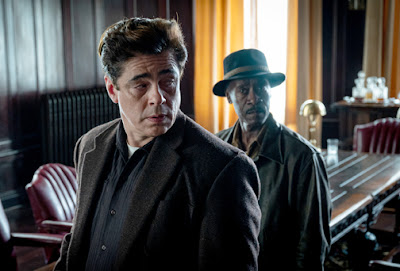Fans of slow-burn crime thrillers will love this one.
Scripter Ed Solomon’s noir-ish saga is given precisely the right look and atmosphere by director Steven Soderbergh and production designer Hannah Beachler. The post-WWII Detroit setting emphasizes the deplorable racial divide between cozy white neighborhoods and decaying inner-city Black districts, and the wary mistrust this prompts from both sides.
 |
| Having maneuvered their way up the conspiratorial food chain, Ronald (Benicio Del Toro, left) and Curt (Don Cheadle) are startled by where they've suddenly wound up. |
The year is 1954. Curt Goynes (Don Cheadle), recently released from prison, is offered a job by shady go-between Jones (Brendan Fraser). It sounds simple enough: babysit the family of low-level General Motors executive Matt Wertz (David Harbour) for a couple of hours.
“Babysit,” meaning “guard at gunpoint while something goes down elsewhere.”
Jones also recruits Ronald Russo (Benicio Del Toro), similarly down on his luck, who isn’t wild about sharing a job with, ah, someone of color. (Cheadle’s dry amusement, when the two men share the back seat of Jones’ car, is priceless.) The little gang is augmented further by Charley Barnes (Kieran Culkin), who outlines the plan.
Charley will “escort” Matt to his office, to retrieve a document from a certain safe. Curt and Ronald will keep Matt’s family at home: wife Mary (Amy Seimetz) and their two children, Matthew Jr. (Noah Jupe) and Peggy (Lucy Holt). The three criminals will remain masked the entire time; if everybody cooperates, everybody lives.
The raw intensity of the early morning home invasion is palpable, as Mary and her children are startled by the sudden appearance of these three menacing intruders. Curt’s calming words do little to ease the atmosphere of terror; Seimetz’s performance is sublime, as the terrified Mary — and we — expect something awful to happen, at any moment.
Charley drags Matt away on their little errand, which — alas — doesn’t go quite according to plan. In the aftermath, Ronald and Curt are on the run, having done the one thing both hoped to avoid: antagonizing rival crime lords Frank Capelli (Ray Liotta) and Aldrick Watkins (Bill Duke). Ronald has uncomfortable history with Capelli, while Curt dearly hopes to avoid a fresh encounter with Watkins.
Ah, but Curt is a planner, and he has an ace up his sleeve; he’s also — rather generously — willing to work alongside Ronald. This surprises the latter, whose initial antipathy morphs into grudging respect, and then reluctant trust: not easy, in an environment of double-crosses, where it appears nobody can be trusted.
Del Toro handles this transformation superbly, as the instinctive aversion in Ronald’s gaze does battle with the realization that self-preservation is more important than reflexive racism. Del Toro is famous for his sleepy-eyed slow takes, and a half smile that isn’t the slightest bit friendly.
Back in suburbia, the morning’s unusual activities have drawn the attention of State Police Det. Joe Finney (Jon Hamm), whose shrewd gaze — we immediately sense — misses nothing.
Additional sidebar characters make matters more complicated: Paula Cole (Frankie Shaw), secretary of Matt’s boss, Mel Forbert (Hugh Maguire), and also Matt’s mistress; Capelli’s wife Vanessa (Julia Fox), also Ronald’s former mistress; and the Wertz’s neighbor Dawn Atkinson (Katherine Banks), whose relationship with Mary might be a bit stronger than casual friendship.
Solomon cleverly borrows tropes from other classic crime sagas. Harbour’s Matt is a foolish, frantic, babbling imbecile whose every move makes matters worse: very much in the mold of William H. Macy’s similarly idiotic mope, in 1996’s Fargo.
Cheadle’s Curt, in turn, echoes crime novelist Donald E. Westlake’s career criminal Parker; no matter what else goes down, Curt merely wants the $5,000 that he has long felt is his due, for past services. Cheadle exudes quiet dignity, pragmatism and patience; unlike most of these other characters, who act impulsively and rashly, Curt chooses his moments carefully.
The document in question initially feels like a Hitchcockian MacGuffin: driving the action, but having little significance in and of itself … until we hit the third act, at which point it proves totally consequential.
The plot expands exponentially, with jabs at institutional red-lining, hostile gentrification, and even industrial espionage and major-level conspiracy.
The topic of the latter, revealed during text blocks prior to the end credits, will leave you aghast and enraged; it’s yet another example of the brilliantly twisty intricacy of Solomon’s script. This isn’t merely a mordant, attitude-laden crime drama; many of its plot elements draw from actual historical events.
One example: When Curt returns to his old haunts, to retrieve something he carefully stashed prior to his incarceration, his brief and uneasy conversation with Clarisse (Lauren LaStrada) and Rudy (Wallace Bridges) includes the latter’s bitter announcement that their neighborhood is about to be demolished. This references the early 1950s razing of Black Bottom, a once-thriving community on Detroit’s East Side.
That said, the relationships between Curt, Clarisse and Rudy are oddly under-defined: the only time that it feels like a few key pages were removed from Solomon’s script.
He and Soderbergh are quite comfortable with this territory, having previously collaborated on the 2017 HBO serial murder mystery, Mosaic. They tease and play on our expectations here, blending tantalizing informational nuggets with unexpected bursts of violence.
Composer David Holmes — who previously worked with Soderbergh on Out of Sight, Mosaic and the Ocean’s trilogy — supplies a moody, atmospheric jazz score that adds just the right noirish bounce.
Sharp script, deft direction and sublime performances. You can’t ask for much more.
No comments:
Post a Comment